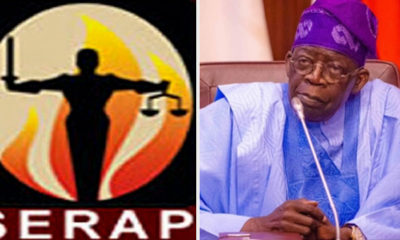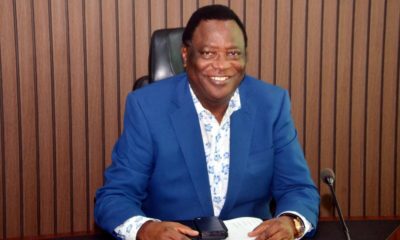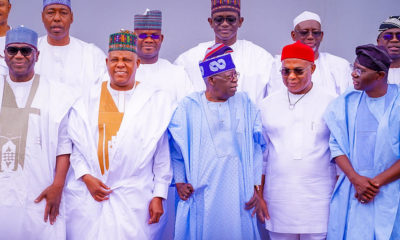NEWS
SERAP Calls Out Tinubu On Loan Agreements By Former Presidents

The Socio-Economic Rights and Accountability Project (SERAP) has urged President Bola Tinubu “to direct appropriate ministries, departments and agencies (MDAs) to provide our organization with copies of the loan agreements obtained by the governments of former presidents Olusegun Obasanjo, Umaru Musa Yar’Adua, Goodluck Jonathan and Muhammadu Buhari.”
In a statement made available to Biztellers, the SERAP also sought “the spending details of any such loans as well as the interests and other payments so far made on the loans.”
In addition, the SERAP urged President Tinubu “to establish an independent audit on the spending of the loans obtained by the governments of the former presidents, and to make public the findings of any such audit.”
The call was detailed in the Freedom of Information (FOI) request dated 13 April 2024 and signed by SERAP deputy director Kolawole Oluwadare.
The not-for-profit said, “Publishing copies of the agreements would prevent and combat waste, corruption, mismanagement, and abuse in the spending of public funds.
“No one should be able to pull curtains of secrecy around decisions on the spending of public funds which can be revealed without injury to the public interest. Democracy requires accountability and accountability requires transparency.”
According to the SERAP, “Nigerians are entitled to information about what their government is doing in their name. This is part of their right to information.”
The FOI request, read in part, “Nigerians’ right to a democratic governance allows them to appreciably influence the direction of government, and have an opportunity to assess progress and assign blame.
“The accountability of government to the general public is a hallmark of democratic governance, which Nigeria seeks to achieve.
“Your government should make it possible for citizens to have access to the agreements and spending details to judge whether their government is working for them or not.
“Publishing the agreements would demonstrate your oft-expressed commitment to openness in government and to promote accountability. It would also improve public accountability in ministries, departments and agencies (MDAs).
“Publishing the agreements and spending details would allow the public to see how and on what these governments spent the loans and foster transparency and accountability.
“The information may help to explain why, despite several billions of dollars in loans obtained by successive governments, millions of Nigerians continue to face extreme poverty and lack access to basic public goods and services.
“Providing us with copies of the loan agreements signed by the governments of former presidents Olusegun Obasanjo, Umaru Musa Yar’Adua, Goodluck Jonathan and Muhammadu Buhari, and widely publishing the agreements would allow Nigerians to scrutinise it and to demand accountability for the spending of the loans.
“We would therefore be grateful if the recommended measures are taken within seven days of the receipt and/or publication of this letter. If we have not heard from you by then, SERAP shall take all appropriate legal actions to compel your government to comply with our request in the public interest.
“Our requests are brought in the public interest, and in keeping with the requirements of the Nigerian Constitution 1999 [as amended], the Freedom of Information Act, and the UN Convention against Corruption, the International Covenant on Civil and Political Rights and the African Charter on Human and Peoples’ Rights to Nigeria is a state party.
“According to Nigeria’s Debt Management Office, the total public domestic debt portfolio for the country’s is N97.3 trillion ($108 billion). The Federal Government’s debt is N87.3 trillion ($97 billion).
“Nigeria paid $6.2 billion in 2019 as interest on loans while the country paid $6.5 as interest in 2018. Nigeria also paid $5 billion as interest on loans in 2017 while the country paid $4.4 billion as interest in 2016. For 2015, the interest paid on loans was $5.5 billion.
“SERAP is seriously concerned that substantial parts of the loans obtained by successive governments since the return of democracy in 1999 may have been mismanaged, diverted or stolen, and in any case remain unaccounted for.
“Publishing copies of the agreements would also ensure that persons with public responsibilities are answerable to the people for the performance of their duties including the management of the loans obtained between May 1999 and May 2023.
“Your government has a responsibility to ensure transparency and accountability in how any loans obtained by the Federal Government are spent, to reduce vulnerability to corruption and mismanagement.
“The Freedom of Information Act, Section 39 of the Nigerian Constitution, article 9 of the African Charter on Human and Peoples’ Rights and article 19 of the International Covenant on Civil and Political Rights guarantee to everyone the right to information, including to copies of the loan agreements obtained by successive governments since 1999.
“By the combined reading of the provisions of the Constitution of Nigeria, the Freedom of Information Act 2011, the International Covenant on Civil and Political Rights, and the African Charter on Human and Peoples’ Rights, there are transparency obligations imposed on your government to widely publish the agreements and details of the projects on which the loans were spent.
“The Nigerian Constitution, Freedom of Information Act, and the country’s anti-corruption and human rights obligations rest on the principle that citizens should have access to information regarding their government’s activities.”
NEWS
Fuel Crisis: NNPC Unloads 240 Million Liters Of Petrol
In response to the worsening petrol shortage across the nation, the Nigerian National Petroleum Corporation (NNPC) began unloading 240 million liters of petrol.
Five vessels transported the fuel into the country on Monday, and was distributed to five depots.
Ayo Cardoso, the South-West Regional Coordinator for the Nigerian Midstream and Downstream Petroleum Regulatory Authority, confirmed the process.
He said, “We are doing something about the fuel crisis; very soon it will be over. Vessels are discharging as I am talking to you. What we are concentrating on is to push the NNPC, which is the supplier of last resort, to make sure they wet the entire populace.
“So, we have about five vessels already discharging the product, about 240 million litres are being discharged as I am talking to you right now. We are working round the clock.
“But then, once you have a problem, it takes like one or two weeks to (normalise), but people will keep on panicking, which is not supposed to be.
“All these kinds of things disrupt the normal way of operations. But with 240 million litres coming in from five vessels discharging to five depots already today, things will get back to normal.” he added
NEWS
Fuel Queues To Disappear By Wednesday – NNPCL
The Nigerian National Petroleum Company Ltd. has assured citizens that the current fuel scarcity and queue issues will be resolved by Wednesday, May 1.
Mr. Olufemi Soneye, Chief Communications Officer, disclosed this in Lagos on Tuesday.
Soneye stated that the company currently holds an excess of 1.5 billion liters of products, ensuring a supply that can sustain for at least 30 days.
He said “Unfortunately, we experienced a three-day disruption in distribution due to logistical issues, which has since been resolved.
“However, as you know, overcoming such disruptions typically requires double the amount of time to return to normal operations. Some folks are taking advantage of this situation to maximize profits.
“Thankfully, product scarcity has been minimal lately, but these folks might be exploiting the situation for unwarranted gain. The lines will be cleared out between today and tomorrow.” he assured
Likewise, Mr. Hammed Fashola, the National Vice President of the Independent Petroleum Marketers Association of Nigeria (IPMAN), voiced optimism about the easing of queues in Lagos and Ogun this week, citing the assurances of the NNPCL.
Fashola noted that queues in Abuja might persist slightly longer due to the distance from Lagos.
He said “The information available to us from the NNPCL was that there was a logistics problem, and when that happens, it will disrupt the supply chain.
“That might be a delay in the movement of ships from the mother vessel to the daughter vessel before it gets to the depot tanks.
“Before we can correct that, surely it will take some days. I think by Tuesday or Wednesday, there will be more products available for lifti¹ng by marketers. It might take time before it can ease off in Abuja, considering the distance to Lagos and the bad roads; Lagos might be calm this new week.”
According to reports on Monday, stranded motorists and commuters in Lagos expressed concern over the recurring fuel scarcity, leading to a scarcity of commercial vehicles and an increase in fares.
The report highlighted that only a handful of filling stations were operational in Lagos metropolis, resulting in long queues at most locations.
Similar conditions were observed in Abule-Egba, Abbatoir Road in Agege, Akowonjo Road, Bariga, Fola-Agoro, and the Lasu-Igando Road areas, where the few operating filling stations witnessed lengthy queues of vehicles stretching several meters.
NEWS
Accept Tariff Hike Or Face Nationwide Blackout – Adelabu Warns Nigeria
In a dire warning, Minister of Power, Adebayo Adelabu, painted a bleak picture of Nigeria’s energy future, cautioning that failure to enact the planned increase in electricity tariffs could plunge the nation into darkness within the next three months.
Adelabu’s stark revelation unfolded during a high-stakes appearance before the Senate Committee on Power in Abuja on Monday, where scrutiny over the recent electricity tariff escalation by the Nigerian Electricity Regulatory Commission intensified.
He said, “The entire sector will be grounded if we don’t increase the tariff. With what we have now in the next three months, the entire country will be in darkness if we don’t increase tariffs.
“The increment will catapult us to the next level. We are also Nigerians, we are also feeling the impact. For this sector to be revived, the government needs to spend nothing less than 10 billion dollars annually in the next 10 years.
“This is because of the infrastructure requirement for the stability of the sector. But the government cannot afford that. And so we must make this sector attractive to investors and to lenders.
“So, for us to attract investors and investment, we must make the sector attractive, and the only way it can be made attractive is that there must be commercial pricing.
“If the value is still at N66 and the government is not paying subsidy, the investors will not come. But now that we have increased the tariff for A Band, there are interests being shown by investors. ” he added
















